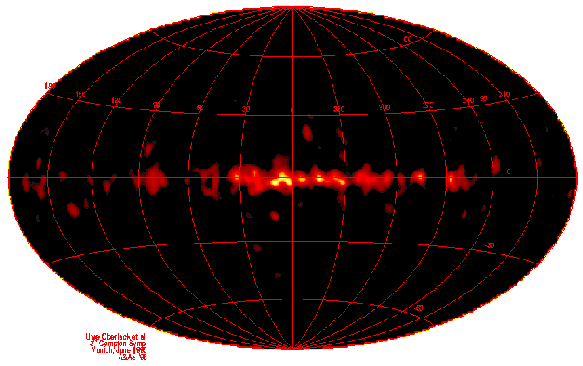
|
Explanation: Diffuse gas clouds laced with radioactive aluminum atoms (Al26) line the plane of our Milky Way Galaxy! How do we see them? Relying on the Compton Effect, the COMPTEL instrument onboard NASA's immense orbiting Compton Gamma Ray Observatory can "see" the 1.8 million electron Volt gamma rays emitted by the radioactive decay. COMPTEL's first ever survey image of the entire sky in the light of gamma rays produced by this exotic radioactivity is shown above. The Galactic plane is horizontal, passing through the Galactic center in the middle of the picture, as indicated by the superposed coordinate grid. The radioactive Al26 clouds are seen to lie in clumps near the plane, with some slightly above and below it. The brightest feature looks like a mysterious inverted "V", just to the left of center. Where do they come from? Al26 decays to magnesium (Mg26) with a half-life of about a million years, a very short time compared to the age of the Galaxy -- so the clouds must have been produced relatively "recently". COMPTEL astronomers are exploring several origins for the radioactive clouds including nuclear processing (nucleosynthesis) by aging massive stars and supernova explosions. Because they are generally thought to be associated with short lived massive stars, the radioactive clouds are expected to be located near sites of recent star formation.
(Note added in press: Don't worry - the aluminum atoms in the foil in your kitchen are Al27 and are not radioactive!)
|
January February March April May June July August September October November December |
| ||||||||||||||||||||||||||||||||||||||||||||||||
NASA Web Site Statements, Warnings, and Disclaimers
NASA Official: Jay Norris. Specific rights apply.
A service of: LHEA at NASA / GSFC
& Michigan Tech. U.
Based on Astronomy Picture
Of the Day
